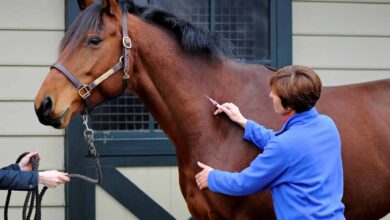Ensuring the health and wellbeing of horses begins with knowing the key indicators of good condition. Just like humans, horses show clear physiological signs when they are thriving. Recognizing these signs is crucial for owners, riders, and trainers to prevent illness, improve performance, and maintain the animal’s overall welfare. Check more on American Association of Equine Practitioners
Understanding Vital Signs
The primary markers of equine health revolve around temperature, pulse, and respiration (TPR).
- Temperature: A healthy horse’s body temperature ranges between 37–38°C (98.5–100.5°F).
- Pulse/Heart Rate: Normal resting pulse is between 28–40 beats per minute. Any persistent deviation may indicate stress, dehydration, or underlying illness.
- Respiration: Horses typically take 10–16 breaths per minute at rest. Labored or unusually fast breathing may signal respiratory problems or overheating.
Physical Indicators of Health
- Gums and Capillary Refill: Healthy horses should have pink, moist gums. A simple test is to press the gums gently with a finger—color should return within two seconds.
- Coat Condition: A shiny, smooth coat is a natural reflection of proper nutrition and care. Dull or patchy hair could be a sign of deficiencies or parasites.
- Eyes and Ears: Bright, alert eyes and attentive ear movements show vitality. Discharge, swelling, or dullness can indicate illness.
Behavior and Energy Levels
A well horse is curious, energetic, and responsive to its environment. Lethargy, isolation, or changes in eating and drinking habits are early warnings of health issues. Horses should maintain steady weight and good muscle tone when properly managed.
Hydration and Digestion
Proper hydration is vital. Horses should drink 20–30 liters of water daily, more in hot climates. Gut health can be monitored by checking manure: regular, moist but well-formed droppings signal a healthy digestive system. Reduced appetite or colic symptoms require immediate attention.
Preventive Care
Consistent grooming, proper farrier care, and regular veterinary check-ups ensure horses remain healthy. Vaccinations and deworming schedules are also essential to prevent disease.
By observing these signs of health in horses, equestrians can act quickly to maintain the wellbeing of their companions. At Al Badia Magazine, we highlight the importance of equine welfare not only for sport but also for preserving the noble traditions of horsemanship. Check our Equestrian Health & Lifestyle section for more updates.








